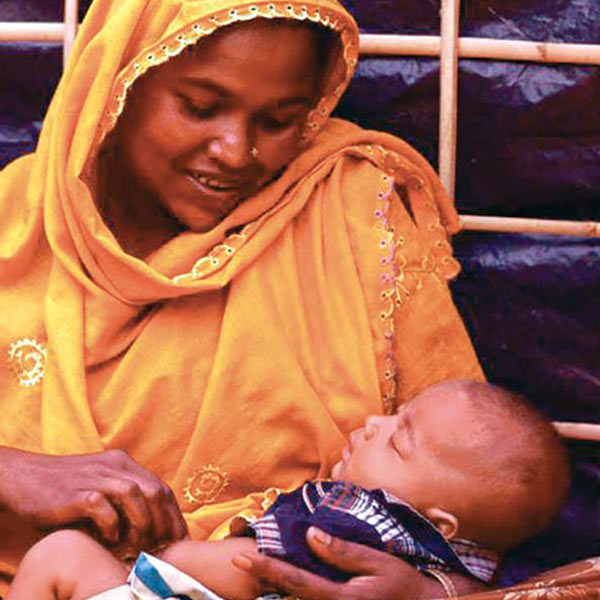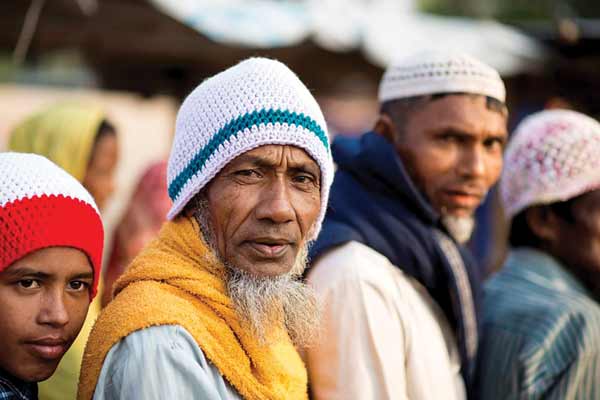Subtotal: $
Checkout-

Were You There?
-

Dangerous Unselfishness
-

Redeeming the Soul of America
-

Powers and Principalities
-

The Casualties of War
-

For the Love of Neighbor
-

Two Friends, Two Prophets
-

Liberation at the Cross
-

Poem: Gaza Is Not Far Away
-

Staying Rooted and Unbalanced
-

Defending Purity
-

Robert Frost’s “Birches”
-

Editors’ Picks Issue 16
-

Definition of a Good Farmer
-

The Naturalist’s Journal: Sightings
-

Gerrard Winstanley
-

Words that Got Martin Luther King Jr. Shot
-

Justice and the Old Testament Prophets
-

The Prophet We Need Now
-

Readers Respond: Issue 16
-

Family and Friends
-

Everyone Should Serve

Next Article:
Explore Other Articles:
Myanmar was ruled by a military junta for more than fifty years. Thousands of innocent people lost their lives during the oppressive rule; many more suffered terribly. The Rohingya people, a cultural minority that has historically been oppressed, have been violently attacked and forced to flee from Myanmar into neighboring Bangladesh.
I came into contact with the Rohingya refugees through my organization, Partners Relief & Development, which helps children who are victims of conflict and oppression. Here are two stories that I’d like to share.
Already a subscriber? Sign in
Try 3 months of unlimited access. Start your FREE TRIAL today. Cancel anytime.
Yasmine was nine months pregnant when the army threatened to destroy her home, and her whole village was forced to run. They walked in the heat of the day, constantly looking back to see if the soldiers were getting closer. From afar they could see the smoke of their houses burning. There was no turning back.

Yasmine with her son in a Bangladeshi refugee camp
She delivered her baby in the jungle that night. The villagers risked their lives to stay with her until the baby was born, but then she insisted that they go: “You need to leave and get to Bangladesh. I will stay here for a bit with the baby and recover.” Nobody wanted to leave her, but they knew she was right, and left. Yasmine spent the night alone with her new baby in the jungle, not daring to sleep as she listened for the sound of the enemy approaching. “I was so afraid,” she recalls. The next day she got up and kept walking, eventually reaching Bangladesh. She now lives with nine others in a small shack in a crowded refugee camp, where I met her.
She related this story as I held her baby. “I haven’t given him a name yet,” Yasmine told us, and laughingly added, “I thought I would call him Problem.”
I don’t know what this little child’s life will hold. He lives in an overcrowded camp in a country that doesn’t want him, where there is not enough food, water, or shelter to go around. He has no citizenship, no assurance of education, no privacy, and only minimal health care.
But what I do know is this: he is created in the image of God, and I will do my best to make sure the world knows.
Later we visited a family that had just arrived in Bangladesh. They had left everything in Myanmar: their rice fields, vegetable gardens, cows, chickens, cats, and dogs. They had left their houses, blankets, cooking pots, mortars for grinding spices and herbs. They had left clothes, children’s drawings, photos, and tools: all those things that give most of us a reason to live. They had nothing left but life itself.
We sat together on an orange tarp, sun striping through the bamboo walls. We didn’t speak the same language, so we did a lot of smiling and selfie-taking. The women, who had spent all morning cooking for us, brought out curries, salads, rice, and condiments – a miracle created with so few resources.
Before we started eating, Yusuf entered. He was a head taller than the rest, and his smile filled the room. I was taken aback by his confidence and charisma.
I thought that perhaps he was a UN official. “No,” he corrected me, “I fled like everybody else.” In fluent English, he explained that he had been working for an NGO that helped children. He had just finished a new house and moved in with his family when the soldiers came. There was no time to plan or pack. They just ran. He told his wife and children to run in one direction and he ran in another, hoping to increase the chance of his family’s survival. “I was hiding in the tall grass hoping the soldiers wouldn’t see me,” he said. “They set all the houses on fire. While I was hiding, I saw them shoot and kill my neighbor’s daughter. There was nothing I could do but watch.”

Since August 2017, more than 650,000 Rohingya refugees have crossed into Bangladesh from Myanmar.
Here at the camp, he assists counselors by following up with traumatized children. “They need a way to process all the bad stories in their heads,” he explained. I couldn’t help wondering what this man could have become, and finally asked him, “What would you do if you could do whatever you want with your life?”
He didn’t even have to think about the answer: “I want to help build and strengthen the community here in the camp.”
Yusuf is a refugee without even a birth certificate to his name. Still he manages to use what he has and what no soldiers can steal from him – his will to live for something great, something that will last.
Photography courtesy of the author
Oddny Gumaer founded Partners Relief & Development (PRAD) with her husband, Steve, and has spent much time in the conflict areas where PRAD works. She is a speaker, author, and mother of three daughters.
Already a subscriber? Sign in
Try 3 months of unlimited access. Start your FREE TRIAL today. Cancel anytime.
































Suzanne Marshall
These people, revealed in Yasmine and Yusuf's stories, realign my Western world's perspective. Yet, where and when I live is where God has placed me. I live in my cushy circumstances with my own Problems and Callings. Referred guilt only paralyzes, but being informed of people's pain should spur me to capitalize on my resources and fulfill my callings wherever I'm called to live or to go.